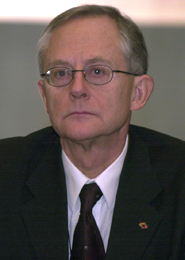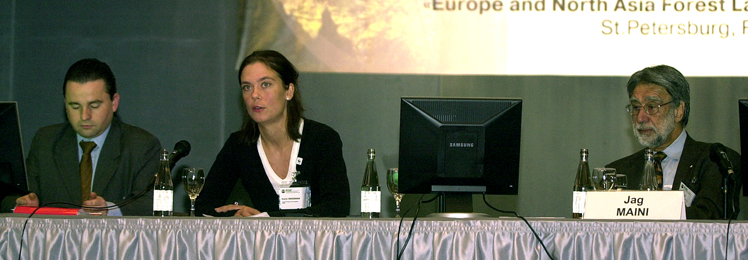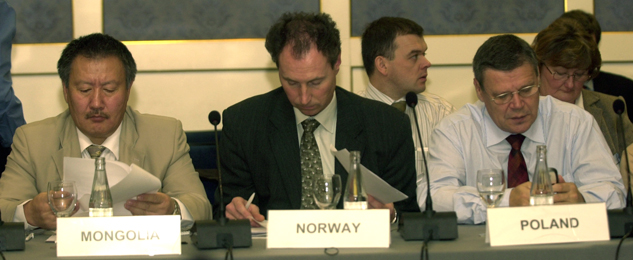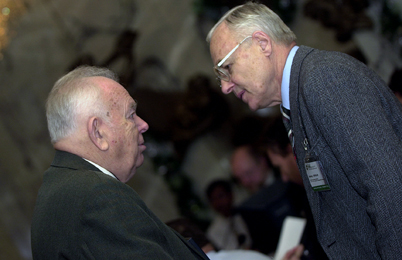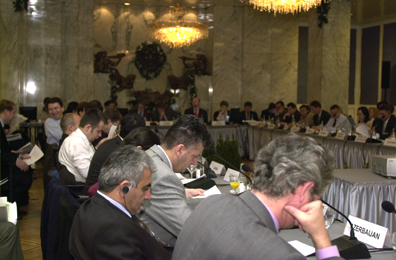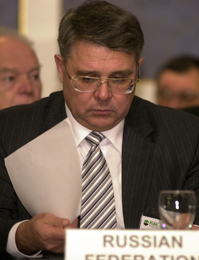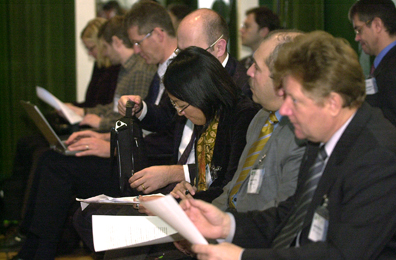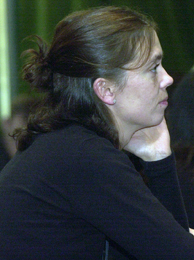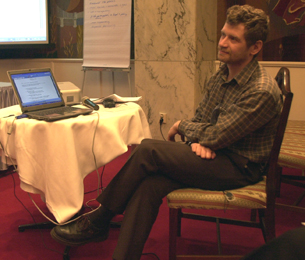|
|
|
Highlights from Wednesday, 23 November
On Wednesday, civil society and industry participants met in three joint sessions to hear status reports on the negotiations session and present input from the multistakeholder process. Delegates then convened a thematic and learning session to hear presentations on improving the investment climate and private sector incentives. In morning and afternoon sessions, delegates met to negotiate the Ministerial Declaration (MD) and the Indicative Action Plan (IAP), while the Civil Society and Industry Dialogue (CSID) continued to formulate multistakeholder input. |
| Co- Facilitators Jag Maini, Canada, Jürgen Blaser, Switzerland, Viktor Teplyakov, Russia, and Elena Kulikova, Russia, during the afternoon intergovernmental negotiation session |
| Thematic and Learning Session: Key Governance Issues in Improving the Investment Climate and Private Sector Incentives |
Anatoly Petrov, All-Russia Training Institute for Forestry Specialists (left), emphasized the need to invest in the forest sector, thus creating jobs. He suggested that the state control financial flows in order to achieve a justified division of forest income and channel a portion of it into infrastructure.
Sofie Beckham, IKEA
Group (right), described IKEA's long-term goal of sourcing wood from well-managed forests, and emphasized the need to assure legality and transparency, and the importance of forest certification.
|
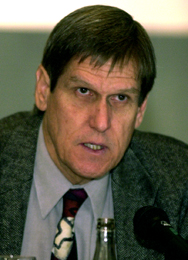 |
|
|
| |
|
Co-Chair of the session Robert Kirmse, World Bank,
Co-Chair Dmitry Chuyko, Ilim Pulp Enterprise, introduced his company's suggestions related to the theme, including acknowledgement of ownership rights, stable laws and tax structures, predictability of customs policy, stimulation of business, investment in infrastructure, and prioritizing enterprises using international standards. Piotr Waldemar Borkowski, Ministerial Conference on the Protection of Forests in Europe (MCPFE), reported on activities of MCPFE, including the recent workshop on illegal harvesting in Madrid. He highlighted the opportunities for synergy between ENA-FLEG and the MCPFE processes. |
 |
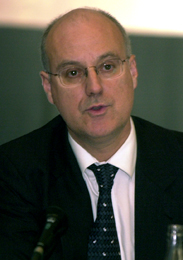 |
|
Mikko Venermo, European Bank for Reconstruction and Development, said that illegal logging is the single biggest issue negatively affecting the investment climate in Central and Eastern European countries. He described the various existing risks due to lack of transparency and to corruption, including market and reputation risk, and stressed that government plays a decisive role in marginalizing risk.
Ragnar Friberg, Stora Enso (right), called for giving due consideration to market risks, the working environment and the problem of corruption, and stressed the importance of assuring long-term wood deliveries. |
| Joint Sessions between governments and civil society and industry |
Bernard de Galembert, International Council of Forest and Paper Associations, Karin Wessman, WWF International, and Jag Maini, ENA-FLEG Co-Facilitator, during the morning joint session
ENA-FLEG Co-Facilitator Jag Maini (Canada) presented paragraphs of the draft MD on the dissemination of information, public awareness, regional cooperation and partnerships. Karin Wessman, WWF International, and Bernard de Galembert, International Council of Forest and Paper Associations, presented recommendations from the multistakeholder process, including: that the ultimate goal of the ENA-FLEG process should be legal, equitable and sustainable forest management; the need for time-bound targets for national actions plans (NAPs); the need for a time-bound follow-up process to the ENA-FLEG; and the importance of raising public awareness. |
 |
 |
Gary Dunning, Chair of the Civil Society and Industry Dialogue, John Hudson, UK, Jurgen Blaser, ENA-FLEG Co-Facilitator, Jan McAlpine, US, and Viktor Teplyakov, Russia, during the second joint session of the day
JOINT SESSION II: ENA-FLEG Co-Facilitator Jürgen Blaser reported that a small working group had met to clarify the geographic scope in the MD, and that the subheadings of national, regional and international were reintroduced into the MD. He said a compromise had been reached to include a clear statement in the preamble that this exercise is collective and that all have a shared responsibility in implementing the actions proposed in the MD. He highlighted shared responsibility, particularly regarding trade aspects.
|
| Intergovernmental Negotations Session |
Jambalragchaa Byambajav, Mongolia, Arne Ivar Sletnes, Norway, and Tomasz Wojcik, Poland |
| Delegates hard at work during the intergovernmental negotiations (left), and participants discuss the text (right) |
| The Spanish delegation consulting (left) and Mikhail Giryayev, Deputy Head, Federal Forestry Agency, Russia (right) |
| Civil Society and Industry Dialogue |
| Karin Wessman, WWF (left), and civil society and industry representatives |
Side event: Innovative Approaches to Support Government Action on FLEG
During this side event, hosted by Taiga Rescue Network, a selection of NGOs presented examples of how to work together on ENA-FLEG implementation |
 |
Alexei Grigoriev, Socio-Ecological Union, discussed backing up legislation with opinion polls
|
| Stuart Wilson, Forest Monitor, discussed independent monitoring for FLEG |
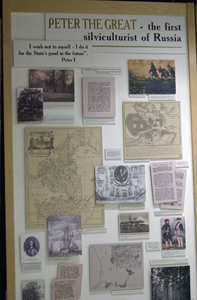 |
Peter the Great: the first silviculturalist in Russia |
|
|
|
|
|
|
|
|
|












